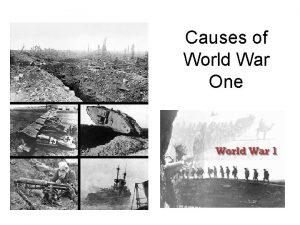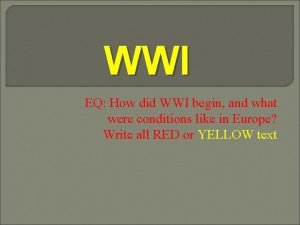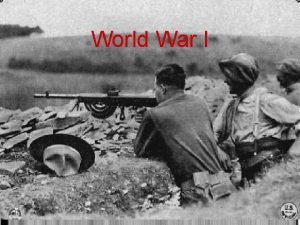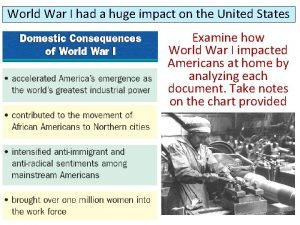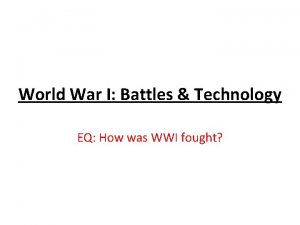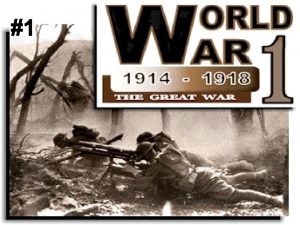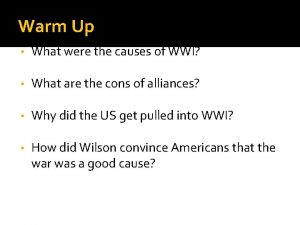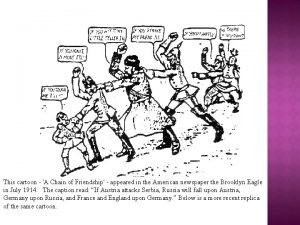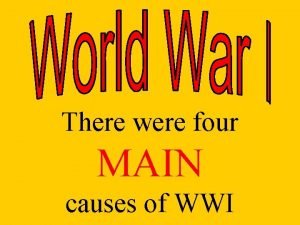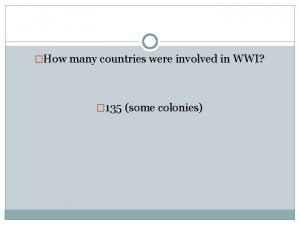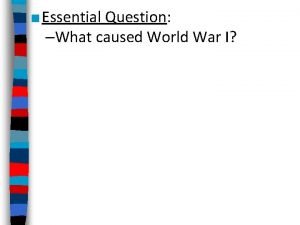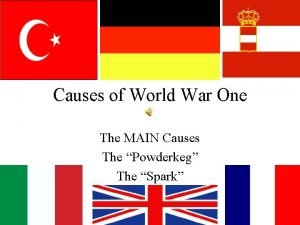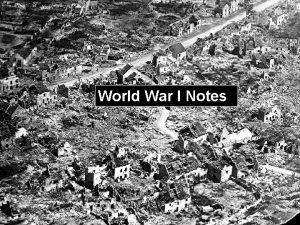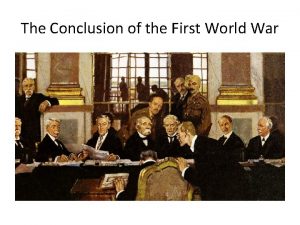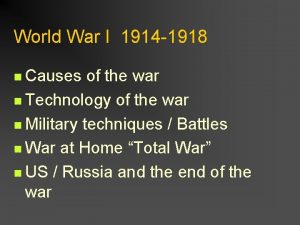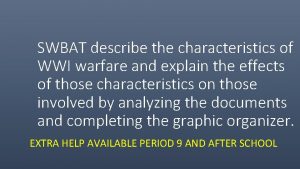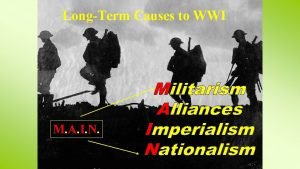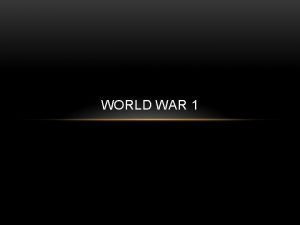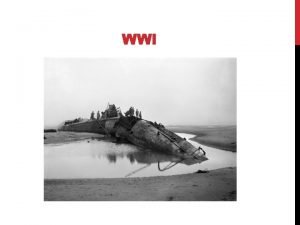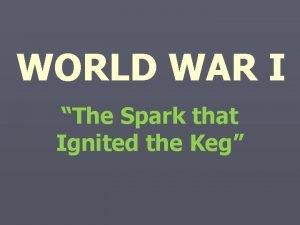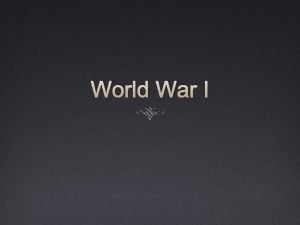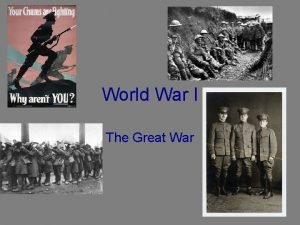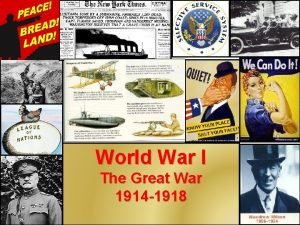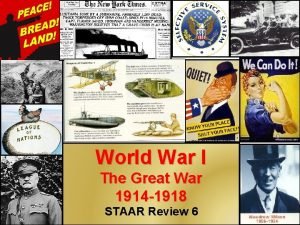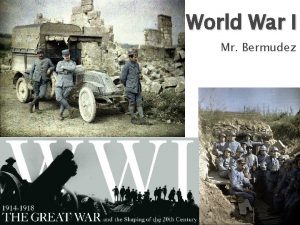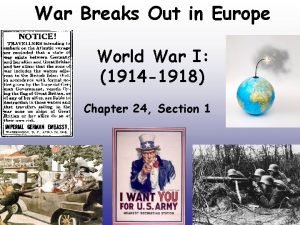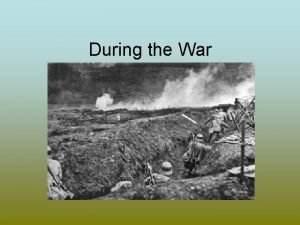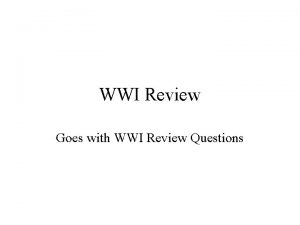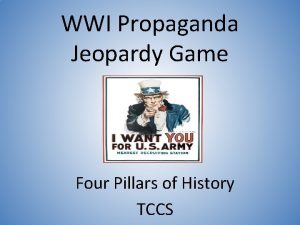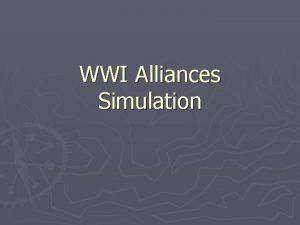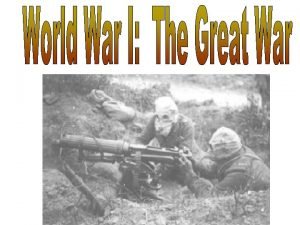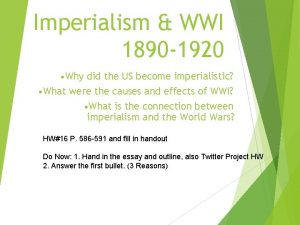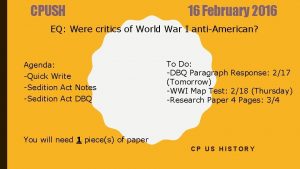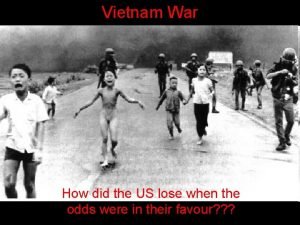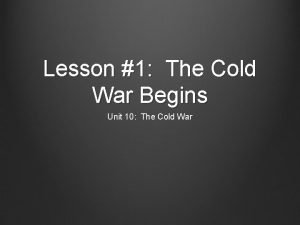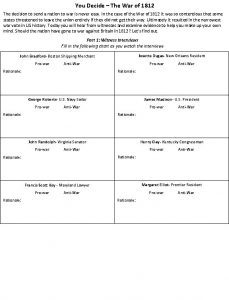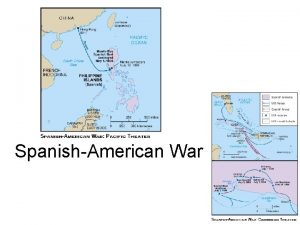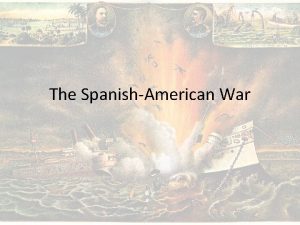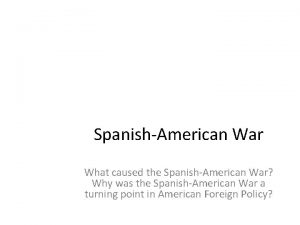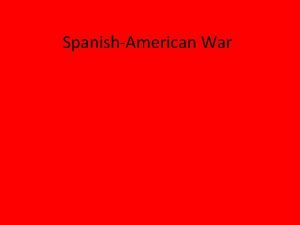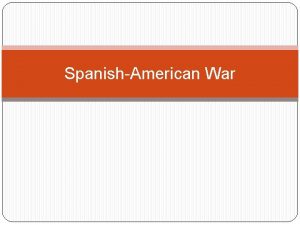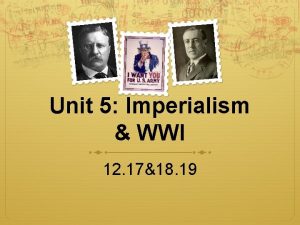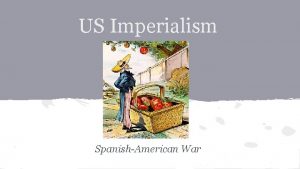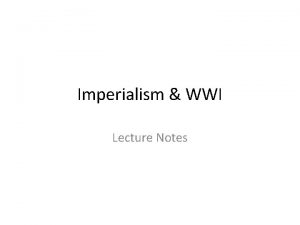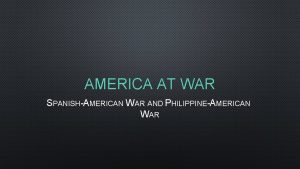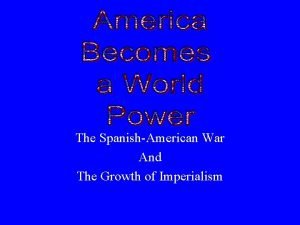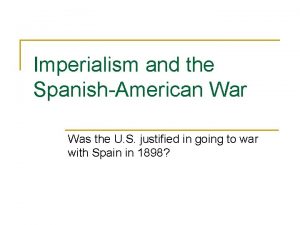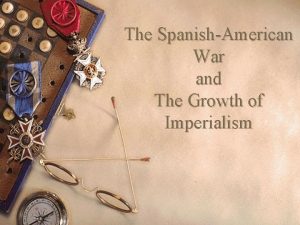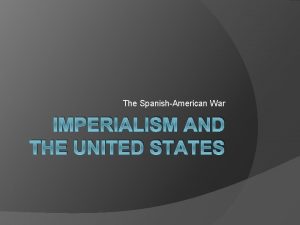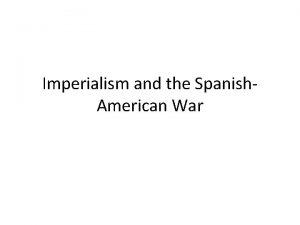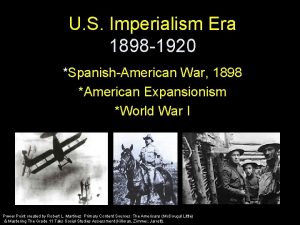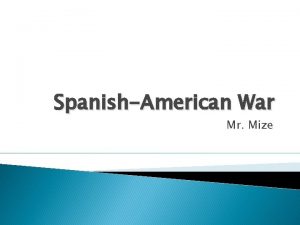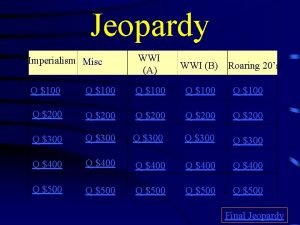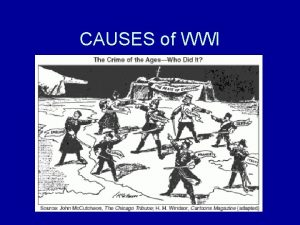Imperialism and WWI Imperialism and the SpanishAmerican War
















































- Slides: 48

Imperialism and WWI Imperialism and the Spanish-American War

American Expansion By the 1880 s many American leaders had become convinced that the US should join the imperialist powers of Europe and establish colonies overseas Imperialism is the policy in which stronger nations extend their economic, political, or military control over weaker territories 3 factors fueled American imperialism: Desire for military strength Thirst for new markets belief in cultural superiority

US Acquires Alaska William Seward, Sec. Of State under Lincoln and Andrew Johnson was a big supporter of imperialism In 1867, Seward arranged for the US to buy Alaska from the Russians for $7. 2 million Some people thought it was silly and called it “Seward's icebox” or “Seward's folly” Alaska didn’t become a state until 1959 Alaska was rich in timber, minerals and oil

Hawaii was important to the U. S. b/c: location– half way to China U. S. wanted to establish a naval base. Pearl Harbor US military helped overthrow Hawaiian Queen Liliuokalani Annexation complete by 1898 - territory NOT A STATE

Cuba and the Spanish-American War Cuba revolted against rule by Spain- led by Jose Marti Yellow Journalism-sensational reporting that exaggerated the new to enrage readers Used to make American public sympathize with Cuba and fight Spain U. S. declares war on Spain b/c: De Lome Letter- insulted US President Mc. Kinleyangered American public U. S. S. Maine- US naval ship that exploded in Havana- 260 sailors killed Was an accident but reporters blamed Spain

Spanish-American War-1898 U. S. navy defeated Spanish navy in the Philippines U. S. army defeated Spanish army in Cuba San Juan Hill- US victory that featured a cavalry charge by Teddy Roosevelt’s “Rough Riders” Treaty of Paris (1899) Cuba received independence from Spain US got territories in Philippines, Guam, and Puerto Rico Spain got $20 million from US Significance: US = major world power

Back to Cuba… Platt Amendment- US asserted the right to intervene in Cuban affairs Significance: US made Cuba a “protectorate”- a country whose affairs are partially controlled by a stronger power

Acquiring New Lands-China viewed as potential market for US goods Open Door Policy (1899)- developed by Secretary of State John Hay, stated that all nations should have equal trading rights to China- China should be “open” to everyone Goal was to end “sphere of influence” by European powers and Japan

Acquiring New Lands- Panama US (and Pres. Teddy Roosevelt) wanted a canal across Central America Goal was the shorten the distance, time and cost between Atlantic and Pacific US encouraged and supported Panama rebellion against Columbia Panama Canal- built by US and opened in 1915 US paid Panama $10 million for the canal zone, leased land for $250, 000 each year for 99 years US paid Columbia $25 million for lost territory Sig: Canal was success but hurt US relations with Latin America

Teddy Roosevelt “Big Stick Diplomacy”- use diplomacy when possible but have a strong military to back up your policies if needed- “speak softly and carry a big stick” Roosevelt Corollary- added to Monroe Doctrine Said that US would be the police power in the Western Hemisphere in dealing with Latin American countries Hurt relations with Latin American countries

William Howard Taft “Dollar Diplomacy”- Taft urged American banks and businesses to invest in Latin America Promised business interests that the US would intervene in investments were threatened Significance: hurt relations between Latin American countries and the US

Imperialism and WWI US Involvement in WWI

Causes of WWI (1914 -1918) Militarism Alliances Imperialism Nationalism Militarism- During the 1800 s militarism had increased around the world, making nations eager to use military force. Most nations had built massive armies and navies with the latest technology. Britain and Germany had the biggest arms race. Alliances- Europe was made up of a system of alliances that kept the balance of power in Europe. Nations agreed to defend each other if attacked. This meant that a war between two nations could escalate into a global conflict.

Causes Continued Imperialism- The European powers, Russia, and Japan competed for economic power in the 1800 s. Britain, France, and Germany competed for colonial gain in Africa, while Britain and Germany competed industrially. Because of their mutual competition with Germany Britain and France formed close ties with each other. Nationalism- Aggressive nationalism was the source of tension throughout Europe. Many French people wanted to take revenge against Germany and regain Alsace and Lorraine. Because of nationalism, the region of the Balkans was known as the “powder keg” of Europe.

Nationalism Definition a shared communal identification with one's nation. It is a political ideology oriented towards gaining and maintaining selfgovernance, or full sovereignty, over a territory of historical significance to the group (such as its homeland). Nationalism therefore holds that a nation should govern itself, free from unwanted outside interference, and is linked to the concept of self-determination

The War Begins~ The Spark Not surprisingly, WWI began in Bosnia, which was the heart of the ethnically diverse Balkan powder keg. Although inhabited by many Serbs, Bosnia was not ruled by Serbia, but by Austria. When Franz Ferdinand, the heir to the Austro-Hungarian throne, traveled through Bosnia in June 1914, he was assassinated by Serbian nationalist Gavirilo Princip. The assassination of Ferdinand is known as the “spark” that started the Great War.

German War Plan- Schlieffen Plan Germany was faced with a two front war in 1914, with Russia to the east and France to the west. German army general Schlieffen organized a battle plan designed to take on both France and Russia. The idea was to quickly defeat France first, and the defeat the Russians. German generals predicted Russia would be slow to mobilize due to a lack of industrialization and a shortage of railroads.

German War Plan continued In order for the plan to work, German armies had to march through neutral Belgium, which was protected by Great Britain. Once Germany invaded Belgium, GB declared war. Just as planned, Germany swept through Belgium. However, Russia mobilized much quicker than expected. To fight the Russians, Germany had to divert some of its forces to the east, which weakened their forces on the western front.

Horrors of War Trench Warfare led to all types of new horrors on and off the battlefield. Many soldiers suffered from shell shock (combination of lack of sleep and the horrible conditions). The trenches were filthy; infested with rats, polluted water, gas, dead bodies. Men would now be at risk of trench foot from standing in cold, damp mud and not changing socks


Wilson Urges Neutrality Officially the US remained neutral and preferred to maintain their tradition of isolation from European disputes. Cultural Ties- the US had more similarities with the Allies than with the Central Powers (Allies: GB, FR, Russia (kinda), IT----- Central: Germ, Aust. Hung, Ottoman Empire)

Neutrality Gives Way to War In 1917, the neutral United States declared war on Germany for several reasons: 1. Unrestricted submarine warfare. Germany began sinking allied ships by using its U-Boats, or submarines. 2. Lusitania- the Germans sunk the large ocean liner, and did not halt unrestricted submarine warfare Americans on board


3. Zimmerman Note- The British intercepted a message from Arthur Zimmermann, the German Foreign Minister, to his ambassador in Mexico Zimmermann asked for Mexican support and promised that in return Germany would help Mexico conquer New Mexico, Texas and Arizona Historical Significance: These 3 actions by Germany made it so Wilson could no longer call for peace.

America Mobilizes for War When the US entered WWI, the U. S. Army was only a fraction of the size of European armies. President Wilson encouraged Americans to volunteer for service and pushed Congress to pass the Selective Service Act (military draft) 24 million registered for the draft and 3 million were drafted. 500, 000 women joined the workforce for the first time 400, 000 African Americans left the rural South for industrial jobs in the North

War Industries Board The WIB was headed up by Bernard M. Baruch. The WIB encouraged factories to use mass production techniques to increase efficiency and set price controls on products. Effect of the WIB: Wages went up but the cost of living went way up because of the rising cost of food and housing.

Committee on Public Information Propaganda department headed by George Creel. The CPI designed, printed and distributed millions of posters that dramatized the needs of America and its allies. Creel and the CPI’s job was to combine education and widespread advertising to “sell America”. The CPI also stressed the cruelty and wickedness of the enemy (specifically Germany)

CPI Continued Creel and the CPI conducted the greatest sales job ever! Governments were left to find ways to make the war popular for their citizens- besides songs they also used art. Propaganda posters were widespread and targeted all sorts of groups. Effects of CPI- new policies Work or Fight! “Sweetless, Meatless, Wheatless, and Heatless” Victory Gardens





Espionage and Sedition Acts Much like in 1798 America created laws to arrest anyone who spoke out against the war. Punishment included $10, 000 fine and 20 years of imprisonment. Eugene Debs (Socialist Party) gave a mildly antiwar speech and received a 10 - year prison term in federal prison

Schenck v. US Facts: Charles Schenck violated the Espionage Act, which made it a crime to cause refusal of duty in the military. Schenck had distributed pamphlet urging men to resist the military draft. Issue: Schenck’s appeal to the SC argued that his actions were protected by the 1 st Amendment Decision: the Court said that in times of war the government may place limitations on freedom of speech.

Opposition and its Consequences The CPI posters and speeches intensified by portraying Germany as the cruel enemy. Some Americans wrongly generalized that all German people were cruel. Americans stopped teaching German in public schools and we stopped playing Beethoven. Hamburgers= “Liberty Steaks” Dachshunds= “Liberty Pups” German Measles = “Liberty Measles”

Flu Epidemic An unusually deadly form of the influenza, or flu, virus appeared in the US. Historians believe that as many as 30 million worldwide died from the flu. 500, 000 Americans were killed. Possibly spread by soldiers.

The Tides Turn Due to horrible military defeats, hunger and chaos within Russia, a communist revolution occurred against the Czar in 1917. Communist leader Vladimir Lenin pulled Russia out of the war, which greatly upset the other Allies.

Germany Defeated The Germans are closing in on Paris, but the Americans come to the rescue. In 1918 the Allies slowly pushed the Germans back, who were exhausted of men and materials

America’s Greatest Hero Trapped behind enemy lines, Alvin York was being blistered with machine gun fire. York took out the machine gunner with his rifle and stormed the German position with only a pistol. York took the German position at amazing odds. York won the Congressional Medal of Honor

US Gives the Allies the Edge Austria-Hungary surrendered first in 1918, which just leaves Germany. Soldiers for Germany deserted or just refused to fight anymore. Then Germany on 11 th hour of the 11 th day of the 11 th month in 1918 signed an armistice.

Costs of War The war cost the US $35. 5 billion, which was to be paid by taxpayers and war bonds

The “Big Three” Wilson wanted “peace without victory, ” and wanted defeated nations to be treated well to avoid a war of revenge in the future. Wilson introduced America’s goals his Fourteen Points, which were admired by the Germans, but not the other Allies. Wilson wanted to eliminate the basic causes of war, such as conflicts over nationalism and imperialism. Wilson also called for an end to alliances, a reduction of military arms, and selfdetermination

Wilson’s Fourteen Points Self- determination- the idea that the people of Eastern Europe would choose their own form of government Wilson also argued for the freedom of the seas and the formation of the League of Nations- A group of countries with the goal of settling disputes through negotiations rather than war

Fourteen Points George Clemencu (FR), David Lloyd George (GB) and Vittorio Orlando (IT) all said NO to Wilson’s 14 points b/c they thought it was too lenient on Germany President Wilson succeeded in forming the Lo. N. The countries that joined the Lo. N promised to take cooperative economic and military actions against any aggressive country.

Opposition to the Lo. N in the US Although it was Wilson’s idea, the US Congress led by Henry Cabot Lodge and the Republicans rejected the League b/c Americans feared it would pull them into future European wars. The lack of the US severely weakend the League

The Treaty of Versailles Germany’s punishment in the Treaty can be remembered as B. R. A. T. 1. Germany had to accept the BLAME for starting the war in the form of a “war guilt” clause 2. Germany had to pay over $33 billion in REPARATIONS or fines 3. Germany was forbidden to have an ARMY over 100, 000 men, no submarines, and no air force 4. Germany lost TERRITORY- establishment of 9 new nations

What happened to Russia? Since Russia’s new communist government left the war early, they were not invited to Versailles. The Allies wanted to weaken Russia to keep communism from spreading westward

Anger over Versailles Many Nations were upset with the To. V and felt their goals had not been achieved: Germany- Horrified by their reparations, reduced military and territorial losses US- felt the Treaty was too harsh on Germany and the US Congress refused to approve it- signed separate treaty with Germany Russia-angry they were not invited to Versailles Historical significance: the treaty that ended the “war to end all wars” merely provided the motivation for WWII, just 20 years later
 Imperialism wwi definition
Imperialism wwi definition Old imperialism examples
Old imperialism examples New imperialism motives
New imperialism motives Bosnian empire
Bosnian empire How did wwi begin
How did wwi begin Chapter 16 lesson 2 challenges to slavery
Chapter 16 lesson 2 challenges to slavery Ww1 webquest answer key
Ww1 webquest answer key Wwi n
Wwi n Cause of ww1
Cause of ww1 Impact of wwi
Impact of wwi New technology in wwi
New technology in wwi What were the 4 main causes of wwi
What were the 4 main causes of wwi World war i combatants
World war i combatants Ww1 chain of friendship cartoon analysis
Ww1 chain of friendship cartoon analysis What were the m.a.i.n. causes of wwi
What were the m.a.i.n. causes of wwi How many countries were involved in wwi
How many countries were involved in wwi What caused wwi
What caused wwi Causes of wwi main
Causes of wwi main Wwi background
Wwi background Mania ww1
Mania ww1 World war 1 conclusion
World war 1 conclusion Cold war jeopardy review game
Cold war jeopardy review game Weapons of wwi
Weapons of wwi Nationalism wwi
Nationalism wwi Wwi
Wwi Main long term & immediate causes of wwi
Main long term & immediate causes of wwi What countries were involved in wwi
What countries were involved in wwi Kwl chart world war 1
Kwl chart world war 1 Crash course ww1
Crash course ww1 The spark that ignited ww1
The spark that ignited ww1 Powder keg of europe ww1
Powder keg of europe ww1 Eastern front line ww1
Eastern front line ww1 What was the cause of world war 1
What was the cause of world war 1 Major causes of world war 1
Major causes of world war 1 Combatants in ww1
Combatants in ww1 War breaks out in europe
War breaks out in europe Wwi alliances political cartoon
Wwi alliances political cartoon Wwi
Wwi Wwi jeopardy
Wwi jeopardy Wwi
Wwi Wwi simulation
Wwi simulation Mania acronym for causes of wwi
Mania acronym for causes of wwi Why did the us enter wwi
Why did the us enter wwi Were critics of wwi anti-american
Were critics of wwi anti-american James madison war at home
James madison war at home Vietnam war
Vietnam war The cold war lesson 1 the cold war begins
The cold war lesson 1 the cold war begins Reconstruction plans venn diagram
Reconstruction plans venn diagram Why was josette dugas for the war of 1812
Why was josette dugas for the war of 1812



